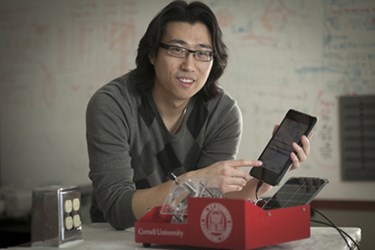Solar-Powered Cancer Testing With A Smartphone
By Joel Lindsey

Scientists at Cornell University and Weill Cornell Medical College have created a cancer-testing device designed to operate on low amounts of solar energy, an innovation that may make the device available for use in remote or impoverished areas of the world.
The new system uses a solar thermal polymerase chain reaction (PCR) device and a new smartphone app to conduct assays for Kaposi’s sarcoma, a form of skin cancer related to HIV infection that has proven particularly deadly in certain parts of Africa.
“Mortality in sub-Saharan Africa following a Kaposi’s sarcoma diagnosis is unacceptably high, even after introduction of antiretroviral therapies,” said Dr. Ethel Cesarman, professor of pathology and laboratory medicine at Weill Cornell Medical College. “This is partly due to the difficulty of making an accurate diagnosis with current technologies, which results in delayed treatment and advanced disease, which is difficult to treat.”
According to an article published on Weill Cornell Medical College’s website, doctors can obtain human skin biopsies, deposit them into the solar thermal PCR device, and then generate full diagnostic tests with the smartphone app.
The entire process operates on about .08 watts of power, which means that a standard smartphone battery would be capable of conducting tests for nearly 70 hours.
“We believe that exploiting the ubiquity of solar thermal energy — as demonstrated here — could facilitate broad availability of nucleic-based diagnostics in resource-limited areas,” said Li Jiang, a doctoral student in Cornell’s Sibley School of Mechanical and Aerospace Engineering, and member of the research team developing the device.
In a recent study published online at Scientific Reports, Jiang and other researchers have reported successfully completing tests in less than half an hour.
“Sunlight-driven DNA amplification removes the power requirements for thermal cycling and enables a 100-fold reduction in power consumption compared to state-of-the-art devices,” the report said. “Tests can be performed in less than 30 minutes, potentially enabling rapid diagnostics in regions where long travel distances to clinics make follow-up meetings with patients difficult.”
“Compared to battery or solar panel-powered systems, solar thermal PCR offers advantages in power consumption and simplicity without compromising PCR performance,” the article concluded.
The researchers are optimistic about the device’s future application in locations where power is scarce.
“DNA tests are extensively used in medical diagnostics since they are sensitive and specific. Some places in the developing world have limited infrastructure and unreliable electricity, and these kinds of tests usually hog energy,” said David Erickson, professor of mechanical and aerospace engineering at Cornell.
Image credit: Jason Koski/Cornell University Photography
